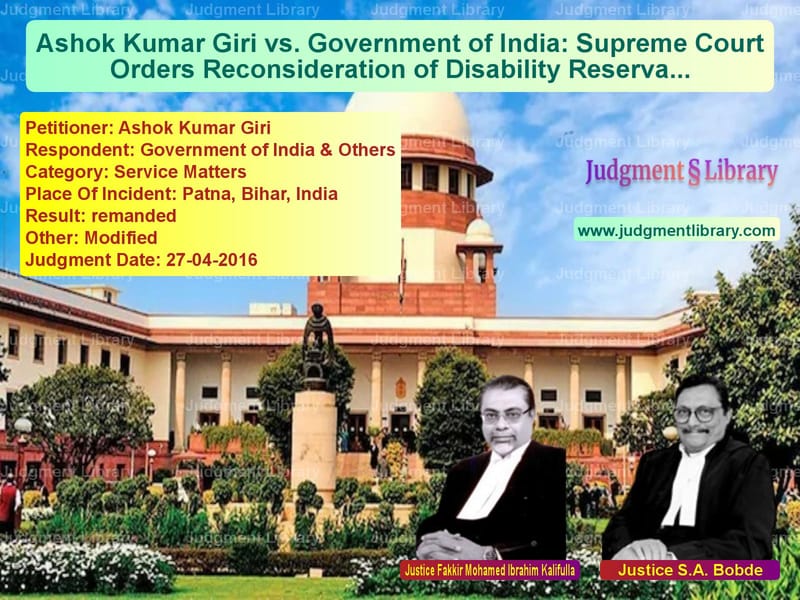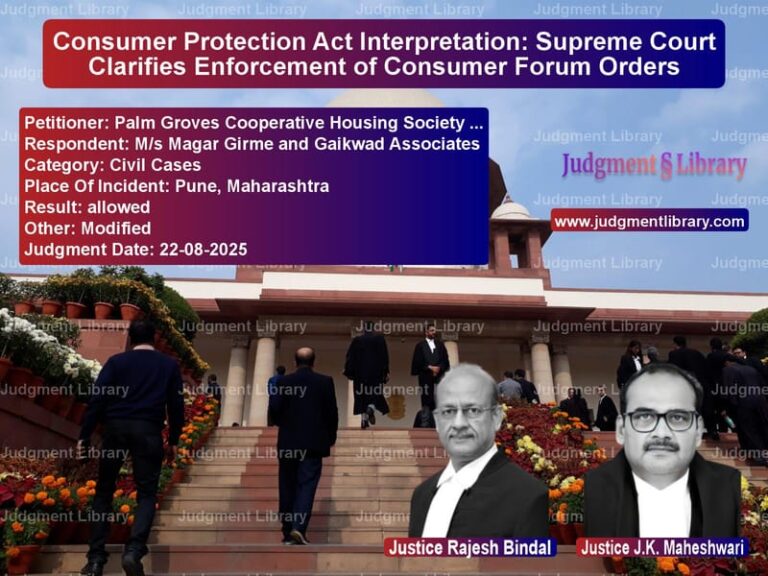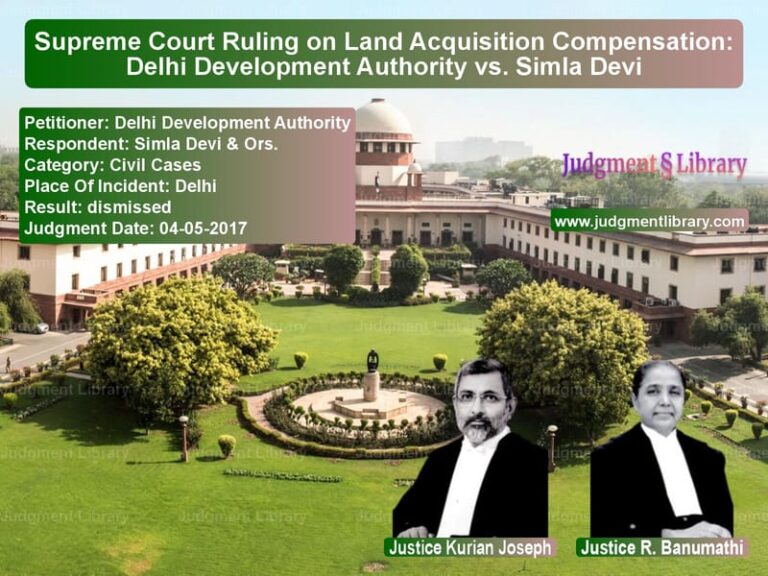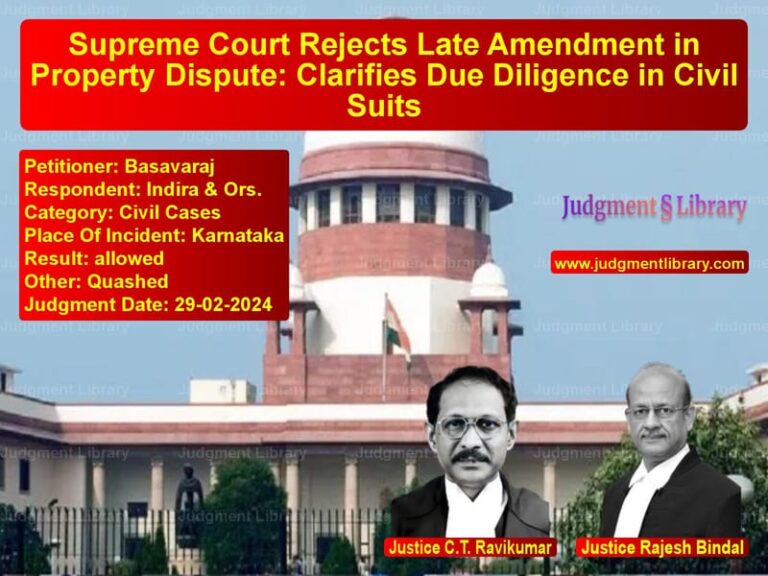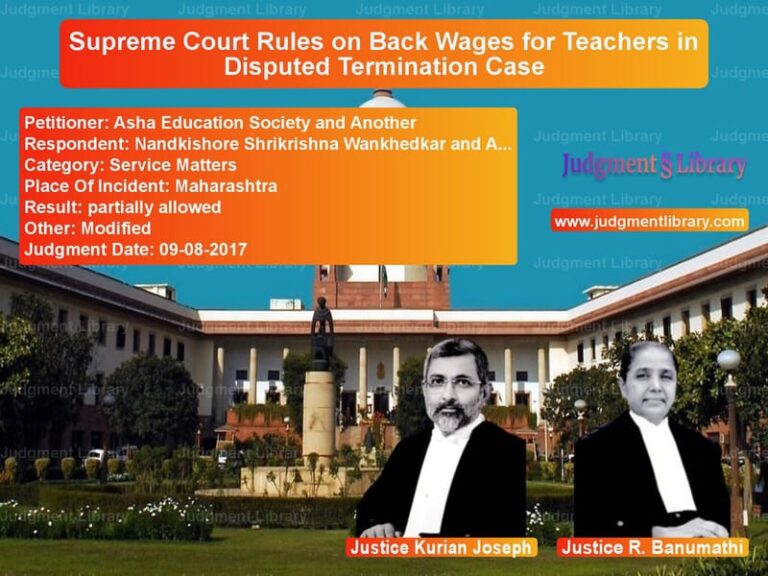Ashok Kumar Giri vs. Government of India: Supreme Court Orders Reconsideration of Disability Reservation
The Supreme Court of India, in its judgment dated April 27, 2016, ruled in Ashok Kumar Giri vs. Government of India & Others, addressing the issue of the computation of disability reservation under the Persons with Disabilities (Equal Opportunity, Protection of Rights and Full Protection) Act, 1995. The case focused on whether the 3% reservation for differently-abled persons should be calculated based on total cadre strength or available vacancies.
Background of the Case
The appellant, Ashok Kumar Giri, filed a petition claiming his right to reservation under the Disabilities Act. The High Court of Patna, in its ruling, determined that the vacancies notified for recruitment did not meet the minimum requirement for reserving a post for persons with disabilities, as the reservation worked out to only 0.27 of a post.
The appellant challenged this decision, arguing that the reservation should be calculated on total cadre strength rather than the number of vacancies advertised at any given time.
Legal Issues
- Whether the 3% reservation under the Disabilities Act must be based on the total cadre strength or available vacancies.
- Whether the High Court’s ruling contradicted the principles established in previous Supreme Court decisions.
- Whether the appellant was entitled to relief under the Act.
Arguments by the Petitioner
- The appellant argued that the High Court erred in computing the reservation based on vacancies rather than cadre strength.
- He relied on the Supreme Court’s decision in Union of India & Another vs. National Federation of the Blind & Others (2013) 10 SCC 772, which established that reservation for differently-abled persons must be calculated based on total sanctioned posts in a cadre.
- The appellant claimed that denying reservation based on limited vacancies would defeat the purpose of the Disabilities Act.
Arguments by the Respondents
- The respondents, represented by the Additional Solicitor General, initially defended the High Court’s ruling but later conceded to the Supreme Court’s legal position.
- They acknowledged that the Supreme Court had already established that the 3% reservation should be calculated on the total number of posts in the cadre.
- The respondents agreed to furnish details regarding the cadre strength and the available vacancies for further review by the High Court.
Supreme Court’s Observations
The Supreme Court examined the principles laid down in the National Federation of the Blind case and made the following key observations:
- Reservation under the Disabilities Act must be computed based on total cadre strength, not merely on the vacancies advertised at a given time.
- Requiring disabled persons to wait for suitable vacancies instead of ensuring proportional reservation across cadre strength violates the intent of the law.
- The High Court’s approach failed to consider the principles established in binding Supreme Court precedents.
- The government must provide data on cadre strength and ensure that 3% reservation is implemented correctly.
Supreme Court’s Ruling
The Supreme Court ruled in favor of the appellant and issued the following directives:
- The judgment of the Patna High Court was set aside.
- The case was remitted back to the High Court for fresh consideration in light of the Supreme Court’s ruling in National Federation of the Blind.
- The government was directed to provide details of the cadre strength and assess whether the appellant was entitled to reservation.
- The High Court was instructed to decide the matter afresh based on the correct legal principles.
Key Takeaways from the Judgment
- Reservation Must Be Based on Cadre Strength: The ruling confirms that reservations for persons with disabilities should be computed on the total number of sanctioned posts, not just on advertised vacancies.
- Binding Precedent: The judgment reinforces that Supreme Court rulings on disability rights must be followed by lower courts and government authorities.
- Accountability for Government Recruitment: The decision mandates government departments to ensure fair implementation of disability reservation policies.
- Judicial Review of Reservation Policies: The case sets a precedent for future challenges to incorrect reservation calculations in public employment.
Conclusion
The Supreme Court’s ruling in Ashok Kumar Giri vs. Government of India is a landmark decision ensuring that persons with disabilities receive their rightful reservation in government jobs. By emphasizing that reservation must be computed based on total cadre strength, the judgment protects the rights of differently-abled individuals and ensures consistency in the implementation of disability laws. The ruling sets an important precedent for future cases concerning the calculation of reservations in public employment.
Don’t miss out on the full details! Download the complete judgment in PDF format below and gain valuable insights instantly!
Download Judgment: Ashok Kumar Giri vs Government of India Supreme Court of India Judgment Dated 27-04-2016-1741854713353.pdf
Direct Downlaod Judgment: Direct downlaod this Judgment
See all petitions in Recruitment Policies
See all petitions in Public Sector Employees
See all petitions in Employment Disputes
See all petitions in Judgment by Fakkir Mohamed Ibrahim Kalifulla
See all petitions in Judgment by S. A. Bobde
See all petitions in Remanded
See all petitions in Modified
See all petitions in supreme court of India judgments April 2016
See all petitions in 2016 judgments
See all posts in Service Matters Category
See all allowed petitions in Service Matters Category
See all Dismissed petitions in Service Matters Category
See all partially allowed petitions in Service Matters Category

